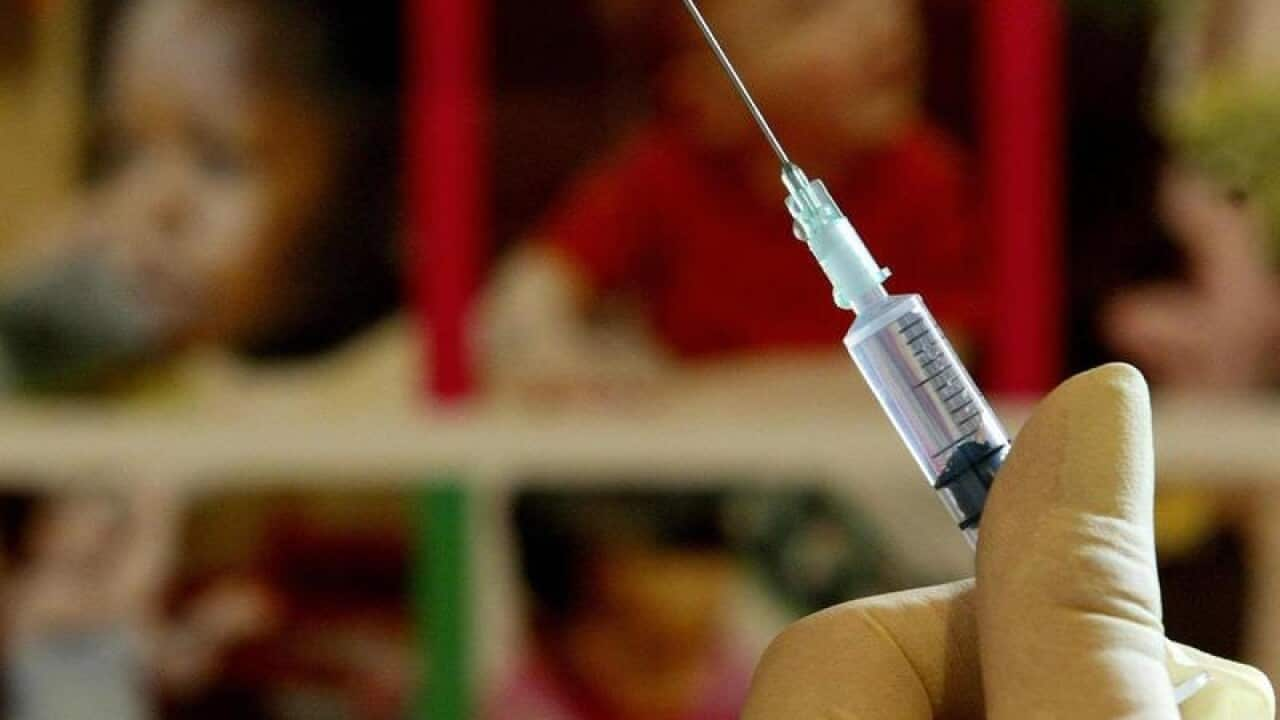Herd immunity is a form of indirect protection from disease that happens to individuals when most of the population (or herd) around them is already immune.
It means vulnerable people who haven’t been exposed to or vaccinated against a disease - such as newborn babies - are safer because the virus can’t spread easily.
High rates of vaccination in a community boost a population’s herd immunity.
Professor Dominic Dwyer, a medical virologist at Westmead Hospital in Sydney, explained that highly infectious diseases which spread more easily require a higher rate of vaccination for herd immunity to work.
“If you've got a highly contagious disease - like measles, pertussis [whooping cough], diphtheria, rubella - then you need to have as many people as possible protected to stop the virus spreading around," he told SBS News.
“If you take something like pertussis, which is spread by airborne droplets, you probably need to have over 90 per cent of people vaccinated against it to prevent the spread in the general community. But if you had something like mumps, which is less contagious, you probably only need to have maybe 80-85 per cent of the population vaccinated to prevent the spread of the disease.”
David and Toni McCaffery lost their four-week-old daughter Dana to whooping cough, a vaccine-preventable disease in 2009. They talk about their experience in the Department of Health video below.
Why is herd immunity important?
Mass vaccination programs have all but wiped out diseases that used to kill thousands of young children a year in Australia such as smallpox and polio. In March 2014, the World Health Organization declared that measles had been eliminated in Australia.
The federal government’s says that “deaths from vaccine-preventable diseases have fallen by 99 per cent, despite a threefold increase in the Australian population” since the introduction of vaccinations for children in Australia in 1932. It estimates that immunisation programmes prevent approximately three million deaths worldwide each year.
Professor Ian Frazer, an immunologist and co-creator of one of the world’s first cancer-preventing vaccines (HPV vaccine) talks about how immunisation saves lives in the Department of Health video below.
But despite free government immunisation programs, universal vaccination is not generally attainable, because there are children who are too young to be vaccinated, people who can't be vaccinated for medical reasons, migrants from countries without vaccination programs, and people who refuse vaccines because of their beliefs. As long as the immunisation rate remains high enough, these people are generally protected by herd immunity.
Why do some groups have lower herd immunity than others?
There has been some concern in public health circles about lower rates of vaccination among certain groups because it leads to lower herd immunity in the sub-group, making them more vulnerable to the outbreak of disease than the general population.
“One of the real difficulties with herd immunity is that the population is not homogeneous. So you might have an area where people haven’t been vaccinated, because they don’t believe in vaccination or they're from a country that doesn't have the same vaccination policies as Australia does, and they might all be grouped together, so you get little spots of disease where the herd immunity doesn’t work,” Professor Dwyer said.
The effectiveness of vaccines can wane over time, he added, so a person who is fully immunised as a child or young person may by the age of 60 become more vulnerable. This is why new grandparents, for example, are encouraged to have a pertussis booster shot before the birth of their grandchildren.
“We have to be alert for all those things we think we’ve suppressed, in case they come back, like mumps, measles, rubella,” Professor Dwyer said.
“Pertussis is one where we’ve started to see an increase in the disease. It’s vaccine-preventable... and the vaccines are pretty good. [But] we’ve seen outbreaks in areas where there is a low rate of vaccination that the general community doesn’t see very often - groups like the Amish in North America or religious groups in Holland, even some of the Steiner schools in Australia where vaccination levels are low.”
- For more information about the Immunise Australia Program, visit or call the information line on 1800 671 811.
- You can access your child’s immunisation statement by visiting Medicare Online Services at the Australian Immunisation Register website:












